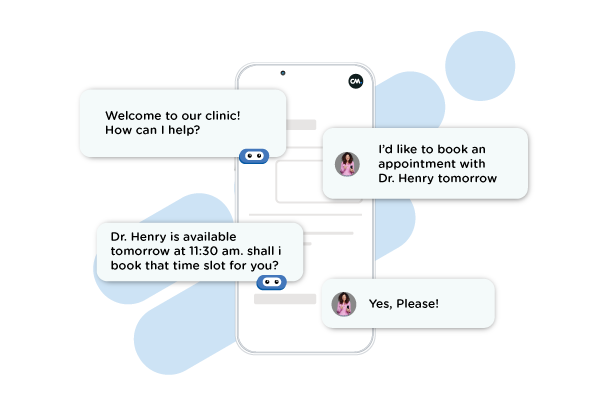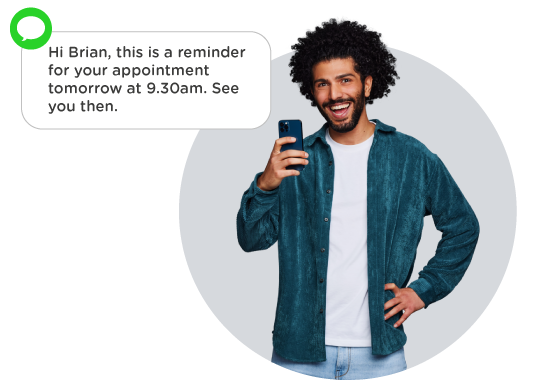- How Conversational AI can help provide exceptional customer service?
- Tips to Improve the end-to-end customer experience in the healthcare industry
- Using Chatbots
- Hyper-Personalization
- Delivering Real Time Customer Service With Live Chat and Co-browsing
- Using data to improve customer experience (CX)
Today's consumers belong to the digital era where they expect convenience, quick delivery, and, most essentially, a range of choices to pick their best alternative form. They prefer to connect and speak with healthcare providers anytime across the platform of their choice. Cisco's research likewise shows that 70% of patients prefer communicating with healthcare businesses via phone or through email right away.
Healthcare is constantly evolving. This also increases the importance for healthcare providers, medical suppliers and institutions to meet the rising customer expectations by providing exceptional and real-time customer service which can be done by opening up multiple communication channels and employing healthcare virtual assistants, to name a few. But where do you start? Conversational AI can be the ideal solution for this.
How Conversational AI can help provide exceptional customer service?
Conversational AI not only helps customers with the right information but also anticipate follow-on questions to deliver a connected customer experience. Below are some of the key applications that are bringing about productive developments in the healthcare industry-
- Scheduling Appointments
- Access to Information
- Assessing symptoms
Customer queries like: 'Where do I get the next vaccination?', 'How long should I undergo medication?', can be simply addressed via emails or chat, yet they mostly go unanswered due to the shortage of healthcare representatives. But, with AI, the information is readily available, and the customers can be assisted with quick responses.
Conversational AI can also be used to understand the symptoms of patients by asking relevant questions and directing them to the healthcare provider based on the symptoms. The applications of conversational AI have created a positive impact on the operational efficiency of the system.
Here's how healthcare players can deliver superior customer service solutions:
- Serving as 24x7 caretakers
- Notifying relevant agency in case of an emergency
- Helping in early diagnosis
- Managing chronic conditions and mental health issues
- Identifying symptoms proactively and cross-checking them with the medical history
- Providing timely medical advice
Before we go on providing tips on how a great customer experience can be delivered, let's first have a look at the challenge surrounding healthcare customer service:
According to The Keckley Report, less than 20% of healthcare transactions are done directly out-of-pocket by consumers. Most transactions are business deals between clinics and hospitals and other entities like medicine suppliers, medical device makers, and insurance providers, among others. Today, customer service in healthcare is more focused on satisfying the business transactions between trading partners in the supply chain than customer service involving patients.
Tips to Improve the end-to-end customer experience in the healthcare industry
Using Chatbots
According to studies, predictive AI solutions have been shown to significantly improve the efficiency of patient overflow. There was a 60% increase in the ability to admit patients and a 21% rise in the number of patients discharged. As a result, customers had a better and faster experience. Chatbots are one of the most inventive and beneficial AI technologies that may totally transform the user experience of any healthcare service. From sorting services to post-appointment follow-ups and much more, bots can make the patient's trip frictionless and hassle-free.

Healthcare providers are using chatbots on their websites and mobile apps to ensure 24/7 availability for their patients. This gives a much better experience to patients, and they would like to stick around for longer.
Chatbots can ease out tedious, repetitive tasks performed by healthcare workers, such as responding to a patient’s repetitive questions or essential guidance. This also reduces human errors and improves the overall customer experience.
Hyper-Personalization
Personalized customer experiences in healthcare are not a new concept. However, with advances in digital innovations, hyper-personalization is a game changer while providing the best possible experience to your patients. Hyper-personalization is when you take the extra step of personalizing every small aspect of your customer’s healthcare journey. Through hyper-personalized customer experiences, you will be able to generate greater customer loyalty and increased customer acquisition rates.

Your MD uses a combination of AI and personalization to appeal to a vast majority of customers.
By chatting with a bot about their symptoms and experiences, patients get connected to the best doctors for appropriate treatments. This data-driven personalized CX approach has led to its massive popularity over the last few years.
Here are a few ways in which healthcare providers can provide hyper-personalized customer experiences to their patients:
- Have 24×7 face-to-face appointments with doctors or doctor-on-demand services. Personalized live-chat or video calls instead of automated text messages or emails to portray a feeling of empathy.
- Using patients’ records to analyze specific health risks, allergies, etc, and personalize healthcare based on these data. Based on patient health records and patterns, predict any future health risks, ailments, or diagnostic tests, and use these brief patients individually.
- Personalized DNA analysis to identify hereditary conditions and provide personalized health advice based on that.
- Health reminders, personalized appointment scheduling, notifications on offers, and cost-saving recommendations can lead to reduced customer churn.
Delivering Real Time Customer Service With Live Chat and Co-browsing
Today, being present for your customers around the clock and attending to them with utmost precision is what counts as good-quality customer service. Through real time customer service, healthcare providers are able to showcase empathy and compassion towards their customers.
With immediate assistance, customers feel more valued and become comfortable sticking to this healthcare provider for all their healthcare needs. This increases the lifetime business value of customers. Here are a few ways in which best-in-class real-time customer service can be provided to healthcare customers:
1. Live chat
Healthcare service timings are one of the biggest objections faced by most patients today because of the unpredictability and time-sensitive nature of such services. Round-the-clock availability of healthcare professionals just a click away can make the patients feel more valued and at ease. Live chat is one of the most viable options for a 24/7 presence for customers.
Clarification of queries, medication recommendations, analysis of symptoms, and emergency consultations are just a few of the services that can be provided through live chat services.
2. Co-browsing solution
Customer service portals and healthcare telemedicine are becoming more popular. Patients, on the other hand, may find seeking appropriate healthcare services, organising appointments, and retrieving medical data tiresome if they do it all on their own. In such instances, collaborative browsing services can be incredibly beneficial to your patients.
Here is how co-browsing can help in accelerating customer experience:
- It helps in navigating through healthcare systems that can be provided to patients through co-browsing for maximizing the customer experience.
- Co-browsing enables visual engagement using which healthcare providers can offer instant on-screen guidance for tasks such as filling in complex forms, scheduling appointments, etc.
- With live on-screen guidance, your customers’ frustrations are eliminated, and productivity is increased.
By integrating such co-browsing tools with your healthcare CRM, your customers are less likely to look for other healthcare providers for better solutions. Nurturing your customers through visual engagement can lead to more humanized interactions and build confidence in your patients.
Using data to improve customer experience (CX)
Data collection and using the unified data to acquire clinical insights can assist healthcare providers to reach new levels of customer satisfaction. Using a Customer Data Platform can aid in the analysis of data points as well as the elimination of data silos and associated guesswork, resulting in better customer experiences. Leveraging data can help the healthcare industry in the following ways:
- Making decisions with greater accuracy, such as ailment and risk predictions, can lead to life-saving situations. Such experiences will lead to forever loyal and grateful customers.
- Using data, tests can be conducted, and healthcare solutions can be provided with greater accuracy. This leads to lowered patient costs and thus satisfies customers.
- Healthcare providers can use data to pinpoint the essential processes and treatments needed for the healthy recovery and longer life of the patients. You can also inform and educate the patients and their families in the right direction leading to an increased customer satisfaction index.
How does CM.com facilitate great healthcare customer service?
Applications of Conversational AI solutions are infinite. It is only limited by our imagination. The attraction is obvious - quicker response time, a decrease in customer labour and cost, and easier access to data.
Mobile Service Cloud is an all-in-one customer service solution that can help you deliver a better healthcare experience and support to your audience. To know more or schedule a live demo, contact us today. Supporting a wide range of chat channels, it contains all the features that your team will need to deliver phenomenal customer service, and keep customers loyal to and delighted with your business.
Get in touch with us to know more.
